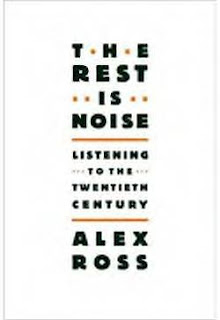The Rest Is Noise

One of the pleasures of committing to read all ten books chosen by The New York Times Book Review's top books of 2007 is that it compels me to read books about subjects I would have never otherwise broached. The Rest Is Noise, by Alex Ross, is just such a book, as it deals with the history of classical music during the twentieth century. Or more precisely, it could be said to be a history of the twentieth-century through the prism of the music composed. This is a sprawling, entertaining and informative book that deals far more than just with composers and their work.
There are problems with the book for the reader who is not well-versed in musicology. For one thing, it doesn't come with musical accompaniment, so no matter how gifted Ross is in describing music (and he's very good--I've written music criticism in my day and I find it to be very difficult) nothing can match actually listening to the music he's writing about. This would make an awesome documentary, either for television or radio. Also, when he gets into the nuts of bolts of the music, writing about chord changes, atonal music, twelve-tone, etc. he might as well be writing in Klingon for readers like me. Consider this passage: "The first notes on the clarinet are simply a rising scale, but it is split down the middle: the first half belongs to a C-sharp major, the second half to G major. This is an unsettling opening, for several reasons. First, the notes C-sharp and G are separated by the interval known as tritone, and one half-step narrower than the perfect fifth." Now, I know what a clarinet is, but the rest of that is meaningless to me.
Fortunately, that kind of technical writing isn't dominant, and instead we get lots of cultural history. Ross begins the book with the debut of Richard Strauss's opera Salome, attended by his colleague Gustav Mahler. These two men frame the opening chapters, along with Arnold Schoenberg, who experimented with atonality, and Igor Stravinsky, who composed the controversial ballet The Rite of Spring. A revolution was going on in music, and lots of feathers were getting ruffled. Composers learned from each other, and took opposite tracks on the purpose of their work. I loved this quote about Schoenberg and his student, Alban Berg: "Schoenberg envied Berg his successes, while Berg envied Schoenberg his failures."
The book's middle section is a fascinating look at state-sponsored music in three nations: Germany under Hitler, Russia under Stalin, and the U.S. under Roosevelt. Of the three leaders, only Roosevelt couldn't be bothered with music. Hitler and Stalin, it turns out, were passionate music buffs, and spent a lot of time interfering with their composers, kind of like George Steinbrenner making late night calls to his managers. The difference was if you disappointed Hitler or Stalin there could be far graver consequences.
In the post-war era, classical music took on stranger and stranger attributes, perhaps best signified by avant-garde composers like John Cage, who composed something called 4'33", which was nothing more than a performer sitting at a piano for that time period, playing not a single note. Eventually jazz and rock and roll would intermingle with classical. Ross is no snob, he discusses how composers influenced rock artists like The Beatles and vice versa, and spends a few pages discussing in detail The Velvet Underground and Bjork.
Perhaps most interesting is the journey that classical music took over a hundred years. As Ross points out: "At the beginning of the century, composers were cynosures on the world stage, their premieres mobbed by curiosity seekers, their transatlantic progress chronicled by telegraphic bulletins, their deathbed scenes described in exquisite detail...A hundred years on, contemporary classical composers have largely vanished from the radar screen of mainstream culture...From a distance, it might appear that classical music itself is veering toward oblivion...to the cynical onlooker, orchestras and opera houses are stuck in a museum culture, playing to a dwindling cohort of aging subscribers and would-be elitists who take satisfaction from technically expert if soulless renditions of Hitler's favorite works. Magazines that once put Bernstein and Britten on their covers now have time only for Bono and Beyonce. Classical music is widely mocked as a stuck-up, sissified, intrinsically un-American pursuit. The most conspicuous music lover in modern Hollywood film is the fey serial killer Hannibal Lecter, moving his bloody fingers in time to the Goldberg Variations."
But Ross goes on to say the picture is not so bleak, and there are still many interesting and creative things going on in classical music, in countries all over the world. I think Ross's book is a significant entry way into discovering this music. He includes a handy list of essential recordings in an appendix, and I just might set about filling in some gaps in my record collection.


Comments
Post a Comment